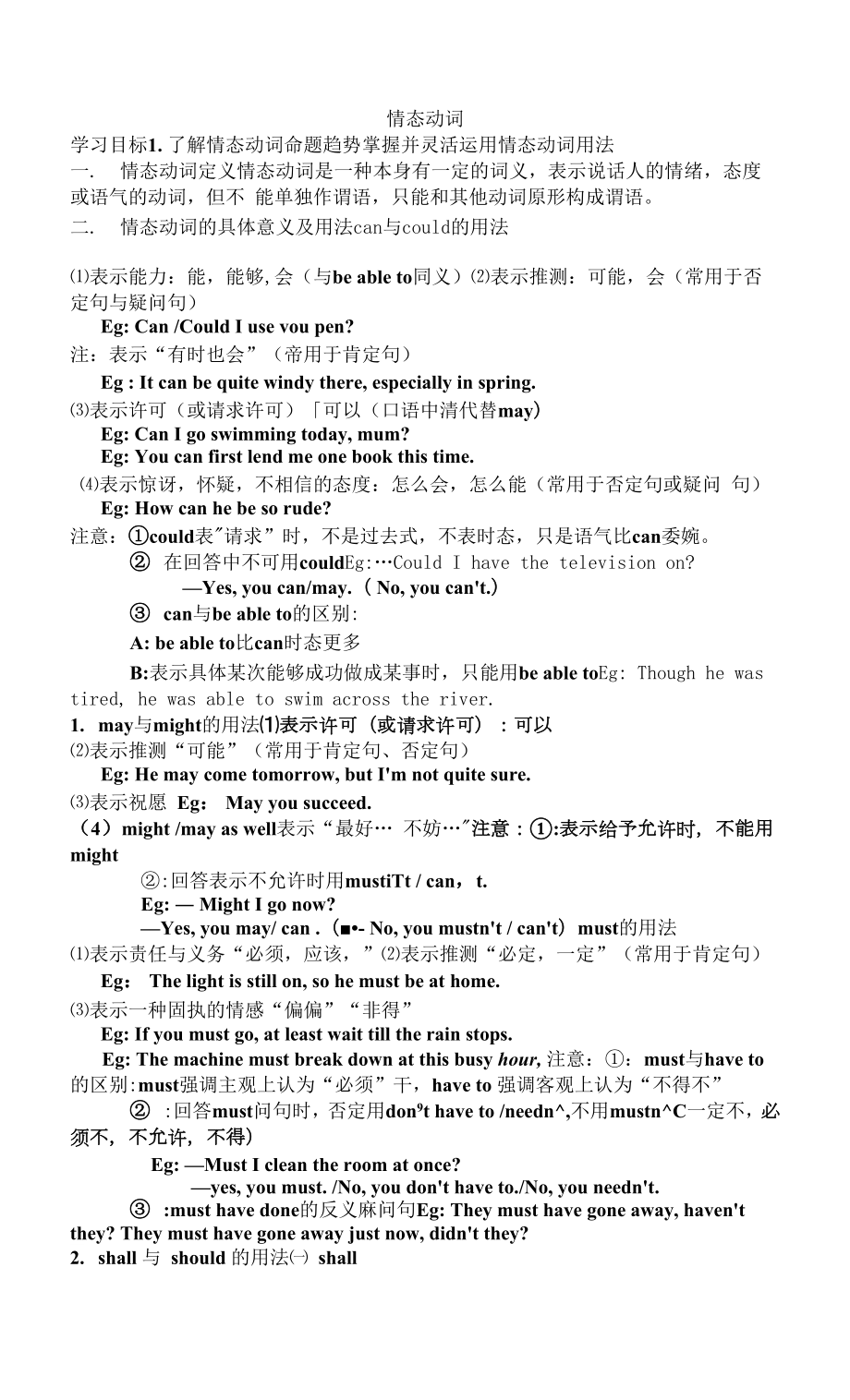《情態(tài)動(dòng)詞講義 高考英語(yǔ)一輪復(fù)習(xí).docx》由會(huì)員分享���,可在線閱讀,更多相關(guān)《情態(tài)動(dòng)詞講義 高考英語(yǔ)一輪復(fù)習(xí).docx(3頁(yè)珍藏版)》請(qǐng)?jiān)谘b配圖網(wǎng)上搜索����。
1、情態(tài)動(dòng)詞
學(xué)習(xí)目標(biāo)1. 了解情態(tài)動(dòng)詞命題趨勢(shì)掌握并靈活運(yùn)用情態(tài)動(dòng)詞用法
一. 情態(tài)動(dòng)詞定義情態(tài)動(dòng)詞是一種本身有一定的詞義����,表示說(shuō)話人的情緒,態(tài)度或語(yǔ)氣的動(dòng)詞,但不 能單獨(dú)作謂語(yǔ)�����,只能和其他動(dòng)詞原形構(gòu)成謂語(yǔ)���。
二. 情態(tài)動(dòng)詞的具體意義及用法can與could的用法
⑴表示能力:能����,能夠,會(huì)(與be able to同義)⑵表示推測(cè):可能����,會(huì)(常用于否定句與疑問(wèn)句)
Eg: Can /Could I use vou pen?
注:表示“有時(shí)也會(huì)”(帝用于肯定句)
Eg : It can be quite windy there, especially in spring.
⑶表示許可
2���、(或請(qǐng)求許可)「可以(口語(yǔ)中清代替may)
Eg: Can I go swimming today, mum?
Eg: You can first lend me one book this time.
⑷表示驚訝�����,懷疑���,不相信的態(tài)度:怎么會(huì),怎么能(常用于否定句或疑問(wèn) 句)
Eg: How can he be so rude?
注意:①could表"請(qǐng)求”時(shí)�����,不是過(guò)去式,不表時(shí)態(tài)��,只是語(yǔ)氣比can委婉���。
② 在回答中不可用couldEg:…Could I have the television on?
—Yes, you can/may.( No, you can't.)
③
3�����、 can與be able to的區(qū)別:
A: be able to比can時(shí)態(tài)更多
B:表示具體某次能夠成功做成某事時(shí)�,只能用be able toEg: Though he was tired, he was able to swim across the river.
1. may與might的用法⑴表示許可(或請(qǐng)求許可):可以
⑵表示推測(cè)“可能”(常用于肯定句��、否定句)
Eg: He may come tomorrow, but I'm not quite sure.
⑶表示祝愿 Eg: May you succeed.
(4)might /may as well表示“最好…
4�����、 不妨…"注意:①:表示給予允許時(shí)�����,不能用might
②:回答表示不允許時(shí)用mustiTt / can����,t.
Eg: ― Might I go now?
—Yes, you may/ can .(■?- No, you mustn't / can't)must的用法
⑴表示責(zé)任與義務(wù)“必須,應(yīng)該,”⑵表示推測(cè)“必定����,一定”(常用于肯定句)
Eg: The light is still on, so he must be at home.
⑶表示一種固執(zhí)的情感“偏偏”“非得”
Eg: If you must go, at least wait till the rain stops
5、.
Eg: The machine must break down at this busy hour, 注意:①:must與have to的區(qū)別:must強(qiáng)調(diào)主觀上認(rèn)為“必須”干���,have to 強(qiáng)調(diào)客觀上認(rèn)為“不得不”
② :回答must問(wèn)句時(shí)����,否定用don9t have to /needn^,不用mustn^C一定不�����,必須不����,不允許���,不得)
Eg: —Must I clean the room at once?
—yes, you must. /No, you don't have to./No, you needn't.
③ :must have done的反義麻問(wèn)句Eg:
6�����、They must have gone away, haven't they? They must have gone away just now, didn't they?
2. shall 與 should 的用法㈠ shall
⑴Shall用于第一���、第三人稱疑問(wèn)句中�,表示說(shuō)話人征求對(duì)方的意見或向?qū)?方請(qǐng)ZK����。Shall he wait outside or come in?
⑵Shall用于第二、第三人稱陳述句中���,表示說(shuō)話人給對(duì)方命令���、允諾、警 告�����、或威脅��。Tell him that he shall have the book.
㈡should的用法⑴Should表示勸告�����、建議
7��、�����、命令,意思為“應(yīng)該�,應(yīng)當(dāng)”,其同義詞是����。light to
⑵表示“萬(wàn)一”
Eg: If it should rain tomorrow, don't expect me.
⑶表示“竟然”
Eg:You can" imagine that a well-behaved gentleman should be so rud e to a lady.
⑷表示推測(cè)“可能,理應(yīng)��,按理說(shuō)應(yīng)該”��,使用這個(gè)詞時(shí)����,往往表示某個(gè)情況 是合理的、正常的�、符合邏輯的。
Eg: — When can 1 come for the photos? I need them tomorrow afternoo
8�、
n.
—They should be ready by 12:00。
⑸表示虛擬should have done (本該干卻未干)shouldn" have done(本不該干 卻干了)注意���;?should與ought to的區(qū)別
出于法令規(guī)則行為規(guī)則違法責(zé)任等客觀情況而應(yīng)該做某事時(shí)
一般用ought to若用should則含個(gè)人意見強(qiáng)調(diào)主觀看法
Eg : We ought to go and see Mary tomorrow, but I do not think we will.
② 在公告須知或條例中出于禮貌常,用shouldYou should not run alon
9、g side the swimming—poo
3. will 與 would⑴表示請(qǐng)求��、建議等(可以),would比will委婉客氣����。
Will/would you please do me a favour?
⑵表示意志:愿望和決心。(愿意)
Eg: He would not help me yestrday.(愿意)⑶Would可表示過(guò)去反復(fù)發(fā)生的動(dòng)作或某種傾向����。(常常)
Would表過(guò)去習(xí)慣時(shí)比used to正式,并沒(méi)有“現(xiàn)已無(wú)此習(xí)慣”的含義����。Wewould sit around grandpa after supper ,listening to his stories.
10、
(4)表將來(lái)“將要”Eg: They will come here.
4. need/dare 的用法⑴need “需要”����,作情態(tài)動(dòng)詞多用在否定句,疑問(wèn)句或條件句中.
You need not hand in the paper this week.
⑵dare “敢”����,作情態(tài)動(dòng)詞多用在否定或疑問(wèn)句中
Dare you catch the little cat?
三. 情態(tài)動(dòng)詞的考察要點(diǎn)表猜測(cè)
a. 對(duì)現(xiàn)在或?qū)?lái)事情的猜測(cè):must/should/ought to/can/should/may/niight+ might+do
b. 對(duì)過(guò)去事情的猜測(cè):must/ can/cou
11、ld /may/might + have done表虛擬
a?與現(xiàn)在或?qū)?lái)事情相反的虛擬:could/would/ might + dob?與過(guò)去事情相反的虛擬(含責(zé)備之意)
could/would/ might/ should/ought to/needn't + have doneEgl.—Look someone is coming. Who can it be?
—It can not be the headmaster. He has gone to Shanghai.(疑 問(wèn)句�、否定句/現(xiàn)在)2 .He wasn't here. He must have been to Sh
12、anghai.(肯定句/ 過(guò)去)
2. Eve was late for class again. She should havegot up earlier.(本應(yīng)該早起)
3. I am feeling sick. I shouldn't have eaten so much chocolate.(本不應(yīng)該吃)
4. …Mr Smith didn't come last night, did he?
…No. We needn't have waited for him. A whole night was wasted.(本不 必等)…Did you listen to the speech?
—No, we could have attended it. But we had a lot of traffic on our w ay?(本可以參加)
 情態(tài)動(dòng)詞講義 高考英語(yǔ)一輪復(fù)習(xí).docx
情態(tài)動(dòng)詞講義 高考英語(yǔ)一輪復(fù)習(xí).docx

